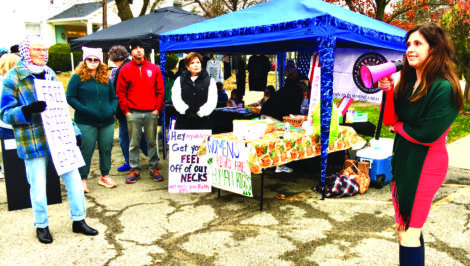ICE secretly deported Pennsylvania grandfather, 82, after he lost his Green Card – Yahoo Home

Report on the Detention of Luis Leon and its Implications for Sustainable Development Goals
Case Summary
- On June 20, Luis Leon, an 82-year-old Chilean national and legal U.S. resident, was detained by U.S. Immigration and Customs Enforcement (ICE) at a Philadelphia immigration office.
- The purpose of his visit was to replace a lost green card. He was taken into custody without explanation provided to his family.
- For several weeks, his family was unable to ascertain his location, leading them to fear he was deceased. This fear was compounded by an erroneous phone call on July 9 claiming he had died.
- Mr. Leon was later located in a hospital in Guatemala City after being transferred from a detention facility in Minnesota. The rationale for his transfer to Guatemala remains unclear.
Subject Profile
- Legal Status: Granted political asylum in the U.S. in 1987.
- Criminal History: No criminal record.
- Health: Suffers from diabetes, high blood pressure, and other health conditions.
Analysis in the Context of Sustainable Development Goals (SDGs)
SDG 16: Peace, Justice and Strong Institutions
The case raises significant concerns regarding the adherence to SDG 16, which aims to promote just, peaceful, and inclusive societies.
- Target 16.3 (Promote the rule of law and ensure equal access to justice): The detention of a legal resident without explanation or due process during a routine administrative inquiry undermines the rule of law. The family’s inability to locate Mr. Leon demonstrates a failure to provide access to justice.
- Target 16.6 (Develop effective, accountable and transparent institutions): The lack of communication from ICE regarding Mr. Leon’s status, location, and subsequent international transfer indicates a severe deficit in institutional transparency and accountability.
SDG 10: Reduced Inequalities
This incident highlights systemic issues related to SDG 10, which calls for reducing inequality within and among countries.
- The case underscores the acute vulnerability of migrants, including elderly and long-term legal residents, within the immigration and justice systems.
- The action against an individual with a clean record points to potential inequalities in the application of immigration enforcement.
- This is contextualized by data showing that 72% of the more than 56,800 individuals currently in ICE detention have no criminal convictions, suggesting a disproportionate impact on non-criminal migrants.
SDG 3: Good Health and Well-being
The events directly contravene the objectives of SDG 3, which seeks to ensure healthy lives and promote well-being for all at all ages.
- The detention and transfer of an 82-year-old with multiple chronic health conditions placed his physical health at considerable risk.
- The prolonged uncertainty and misinformation, including a false report of his death, inflicted severe psychological distress upon his family, negatively impacting their mental health and well-being.
SDGs Addressed in the Article
-
SDG 16: Peace, Justice and Strong Institutions
This goal is central to the article, which highlights a failure of justice and institutional accountability. The detention of Luis Leon without explanation, the lack of information provided to his family, and his deportation to a third country all point to issues with the rule of law and the transparency of institutions (ICE).
-
SDG 10: Reduced Inequalities
The article discusses the treatment of a migrant, an asylum seeker, and an elderly person, all of whom represent vulnerable populations. The policies allowing for deportation to countries where individuals have no ties, as mentioned in the article, directly relate to the unequal and unsafe management of migration, which SDG 10 aims to address.
-
SDG 3: Good Health and Well-being
The well-being of the 82-year-old detainee is a significant concern. The article states he suffers from “diabetes, high blood pressure and other conditions.” His detention and transfer across countries put his health at severe risk, and the emotional distress inflicted on both him and his family (“I can see all my family is in pain right now”) relates directly to physical and mental well-being.
Specific SDG Targets Identified
-
Target 16.3: Promote the rule of law at the national and international levels and ensure equal access to justice for all.
The article demonstrates a violation of this target. Luis Leon, who has a “clean record,” was “handcuffed him and took him away without explanation.” His family was denied information and had to search hospitals and morgues. This shows a lack of due process and access to justice for a legal resident.
-
Target 16.6: Develop effective, accountable and transparent institutions at all levels.
The immigration system’s handling of the case shows a lack of transparency and accountability. The family was “left scrambling, contacting immigration offices” for information on Leon’s whereabouts, and ICE provided no explanation for his detention or his transfer to Guatemala. This points to an institution that is not operating transparently or accountably with the public it affects.
-
Target 10.7: Facilitate orderly, safe, regular and responsible migration and mobility of people, including through the implementation of planned and well-managed migration policies.
The article describes a migration policy that is the opposite of orderly or safe. A Chilean national who is a legal resident of the U.S. was deported to Guatemala, “a country he has never called home.” This action, enabled by a Supreme Court decision, represents a poorly managed and irresponsible migration policy that puts individuals in danger.
-
Target 3.8: Achieve universal health coverage, including financial risk protection, access to quality essential health-care services…
The article notes that Luis Leon is an 82-year-old man with multiple health conditions, including diabetes and high blood pressure. His detention and subsequent hospitalization in Guatemala raise serious questions about his access to continuous and quality healthcare, a key component of this target, especially for vulnerable individuals.
Indicators for Measuring Progress
-
Indicator related to Unsentenced/Arbitrary Detention (Proxy for Indicator 16.3.2)
The article provides a direct statistic that serves as an indicator for arbitrary detention and the status of detainees. It states, “As of this week, there are more than 56,800 people in ICE detention; 72 percent of them have no criminal convictions.” This figure directly measures the number of individuals detained by an authority without having been convicted of a crime, which is a key measure of justice and the rule of law.
-
Indicator related to the Nature of Migration Policies (Implied for Target 10.7)
The article implies an indicator by describing a specific policy outcome. It mentions that the “administration [can] deport immigrants to countries they have never called home.” The existence and implementation of such a policy can be used as a qualitative indicator to assess whether a country’s migration policies are becoming more or less “orderly, safe, regular and responsible.” The case of Luis Leon being sent to Guatemala is a specific data point for this indicator.
-
Indicator related to Access to Justice (Implied for Target 16.3)
The narrative itself serves as a qualitative indicator. The fact that “officers handcuffed him and took him away without explanation” and the family was not informed of his whereabouts implies a lack of access to legal recourse or information. The number of such reported incidents could be tracked to measure progress towards ensuring access to justice for all, including migrants.
SDGs, Targets, and Indicators Analysis
| SDGs | Targets | Indicators Identified in the Article |
|---|---|---|
| SDG 16: Peace, Justice and Strong Institutions | 16.3: Promote the rule of law…and ensure equal access to justice for all.
16.6: Develop effective, accountable and transparent institutions at all levels. |
Quantitative: “72 percent of [the 56,800 people in ICE detention] have no criminal convictions.” (Proxy for unsentenced detainees).
Qualitative: The detention of an individual “without explanation” and the lack of communication with the family about his whereabouts, demonstrating a failure of due process and institutional transparency. |
| SDG 10: Reduced Inequalities | 10.7: Facilitate orderly, safe, regular and responsible migration and mobility of people… | Qualitative: The implementation of a policy that allows the administration “to deport immigrants to countries they have never called home,” as exemplified by the case of a Chilean national being sent to Guatemala. |
| SDG 3: Good Health and Well-being | 3.8: Achieve universal health coverage…access to quality essential health-care services… | Qualitative: The case of an 82-year-old detainee with pre-existing conditions (“diabetes, high blood pressure”) being moved between facilities and countries, culminating in hospitalization, which implies a disruption and risk to his access to continuous and adequate healthcare. |
Source: yahoo.com

What is Your Reaction?
 Like
0
Like
0
 Dislike
0
Dislike
0
 Love
0
Love
0
 Funny
0
Funny
0
 Angry
0
Angry
0
 Sad
0
Sad
0
 Wow
0
Wow
0














































































